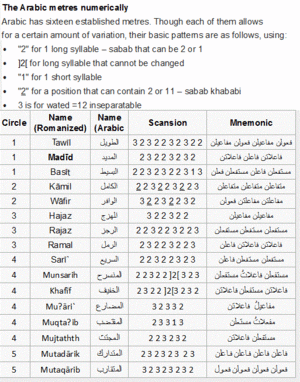Meter (poetry) facts for kids
In poetry, meter (also spelled metre) is like the musical beat or rhythm of a poem. It's how the sounds of words are arranged in a line to create a pattern. Think of it as the steady pulse that makes a poem flow.
Contents
Understanding Poetic Meter
Poetic meter helps give poems a special sound and feel. It's built from patterns of syllables, which are the small sound units in words. For example, the word "water" has two syllables: wa-ter.
How Meter Works
The way meter works can be different depending on the language.
English Meter
In English poetry, meter is mostly about the pattern of stressed and unstressed syllables.
- A stressed syllable is one you say with more emphasis or force.
- An unstressed syllable is one you say more softly.
For example, in the word "happy," "hap-" is stressed and "-py" is unstressed. Poets arrange these stressed and unstressed syllables into repeating groups called feet. Each line of a poem is made up of a certain number of these feet. This creates a predictable rhythm, like a drumbeat.
Other Languages
In languages like Latin and Ancient Greek, meter isn't based on stress. Instead, it's based on the length of syllables. Some syllables are considered "long" and others are "short." The pattern of long and short syllables creates the rhythm in their poems.
Why Meter is Important
Meter helps poets create different moods and effects. A fast, bouncy meter might make a poem feel light and fun. A slow, steady meter might make it feel serious or thoughtful. It also helps make poems memorable and enjoyable to read aloud.
See also

- Rhythm
- Poetry
- In Spanish: Métrica para niños
 | Emma Amos |
 | Edward Mitchell Bannister |
 | Larry D. Alexander |
 | Ernie Barnes |


